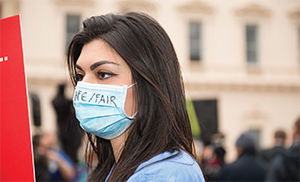
© John Gomez / shutterStock.com
Dr. Hoskins noted that in the high-profile work actions in the UK over the past years, the discussions of longer work actions took time to manifest, time that allowed support to be built. Further, physicians there were able to make their point by having “junior doctors” (British nomenclature for qualified medical practitioners working while still undergoing postgraduate training) conduct the actions.
Explore This Issue
February 2017“This makes sense, because by definition residents cannot be considered essential services,” he said, later adding that the years-long effort “had the benefit of capturing public attention while maintaining public support for the cause.”
But how can management make a work stoppage work? “If you are in management, then I would hope to do everything I can to prevent the strike,” Dr. Hoskins said. “If inevitable, then provide coverage of essential services to allow for the safety of all involved.”
I think the vast majority of physicians would agree that they still have an ethical obligation to provide at least emergency services at all times. Doctors, however, should be allowed to conduct job action. ”—Ryan Hoskins, MD
Know the Ramifications
Work actions in healthcare do, of course, happen. Nurses strike. Support personnel strike. But what actually happens if physicians—and, particularly, non-emergency physicians such as otolaryngologists—decide to strike?
“The patients who are affected are those scheduled for elective procedures,” Kemp said. “Mr. Smith, who has prepped for a routine colonoscopy, must be turned away because the gastroenterologist is not working,” he added. “Mr. Lee is unable to schedule his regular checkup because the family medicine service is not working. Ms. Jones, who is ready to be discharged, must stay several more days because the attending physician refuses to complete the discharge notes.”
But that’s the impact in one medical institution, Dr. Hoskins said. “Individual specialty services holding job actions is probably less effective than all the doctors of a region taking action together,” he added. “When only individual services take action, the disruption will be largely felt by colleagues having to accommodate. If all physicians act together, then the disruption is absorbed more by patients—which is presumably where the impact is designed to be focused.”
Richard Quinn is a freelance medical writer based in New Jersey.
Key Points
- One of the first questions to ask about whether or not a physician can strike involves its impact on the Hippocratic oath.
- Physicians have the right to strike, as do workers in other fields that provide essential services.
- Patients scheduled for elective procedures are usually the ones who feel the most impact from a strike.
Can A Strike Be Good for Patients?
If physicians don’t work, fewer patients die.